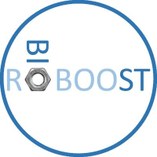Leadership in enabling and industrial technologies - NMP - BioRoboost
H2020 LEIT NMP
The European H2020 project “Fostering Synthetic Biology standardisation through international collaboration (BioRoboost)” is an European coordination and support action to overcome both historical and technical difficulties to define biological standards for synthetic biology. Therefore it brings together a unique combination of 27 prime research laboratories, social scientists, companies and biotech-related experts from Europe, Asia and the US (21 European entities and 6 non- European countries). The project is coordinated by Prof. Manel Porcar (Universitat de Valencia, Spain) and will run from October 2018 till September 2021.
Synthetic Biology is an engineering research field aiming at (re)designing biological circuits for applied purposes. As any other engineering field, it strongly relies on the use of well-defined, universal and robust standard components. The outstanding success of synthetic biology in the last years should not hide the difficulties in defining biological standards. There are both historical and technical difficulties to reach that ambitious goal. On the former: the crossroad nature of synthetic biology involving mainly biologists/biotechnologists and engineers, whose views on the standardisation of living beings tend to differ; among the latter: the intrinsic features of live (mutation, emergent properties, fitness biasses, variability and, of course, evolution).
In BIORBOOST we propose to finally overcome cultural issues and to dramatically advance in solving technical difficulties by i) gathering the most relevant stakeholders of all the aspects of standardisation in biology in Europe in a co-creation scenario; ii) by empirically testing cultural (lab-centric) standardisation practices and by promoting a consensus conceptual and technical redefinition of biological standards; and, finally, iii) by fostering a realistic and flexible toolbox of standard biological parts, including a reduced set of specialised chassis for specific applications as well as a renewed conceptual framework to inform policy makers, scientific and other societal actors.
Objectives
These are the objectives of BioRoboost:
- The setup of an international collaborative network on Synthetic Biology standards with a strong momentum for a sustained engagement beyond the lifetime of the Project.
- Elaboration of a real-time catalogue of research needs on biological standards whose fulfilment demands international teamwork beyond the European realm.
- Coordination of existing material (eg repositories) and computational (eg databases, languages) resources for standardized biology along with harmonization of future initiatives.
- Stocktaking of ongoing standardisation practices aimed at promoting conceptual consensuses and technical (re)definition of biological standards and their metrology in live systems
- Developing and offering the academic and industrial Synthetic Biology community a usable, realistic and flexible toolbox of standardized biological assets, including chassis for specific applications.
- Anticipating societal ramifications and cultural reactions to standardized biology by engaging in a continuous conversation and informed debate with cognate stakeholders.
Role of Ghent University
Ghent University is involved in WP’s which forms the technical core of the project, dealing with development and optimization of biological standards.
Contact
Prof. Marjan De Mey
Department Biotechnology (BW25)
Phone number: +32 9 264 60 28
E-mail
Website
